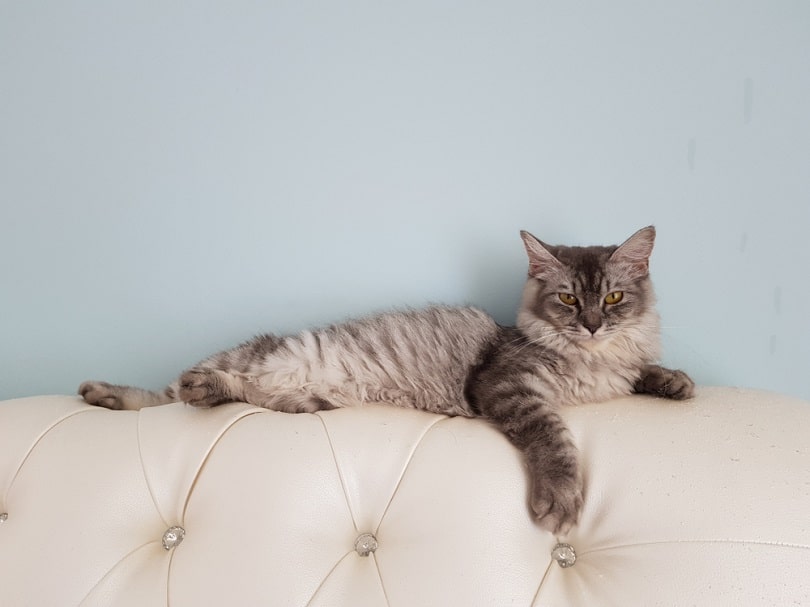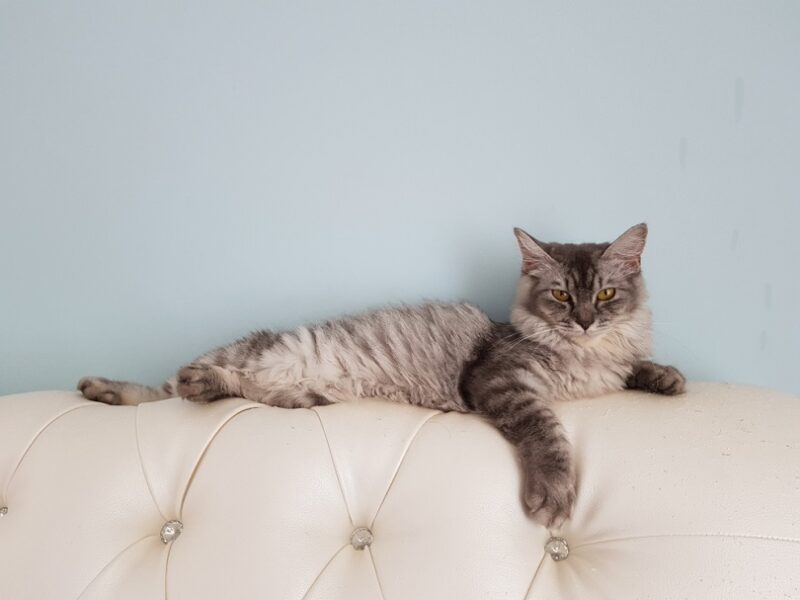Cats are very persistent, and it can be challenging to keep them from doing what they want. Several commercial deterrents use dangerous chemicals that can harm your pet, and pheromone products are expensive and may not work. It’s also easy to stain most fabrics with chemical deterrents, so you will need to be careful about what you put on them.
We’ve compiled a step-by-step guide for keeping cats off your furniture with ordinary, inexpensive white vinegar. White vinegar is safe to use around cats and won’t affect their nervous system like many essential oils. It has no color and won’t stain most fabrics, but the best part is that you probably have some around the house that you can use right now.
The 4 Steps to Keeping Cats off Furniture
1. Gather the Ingredients
Our recipe will call for three ingredients: vinegar, water, and castile soap.
White Vinegar
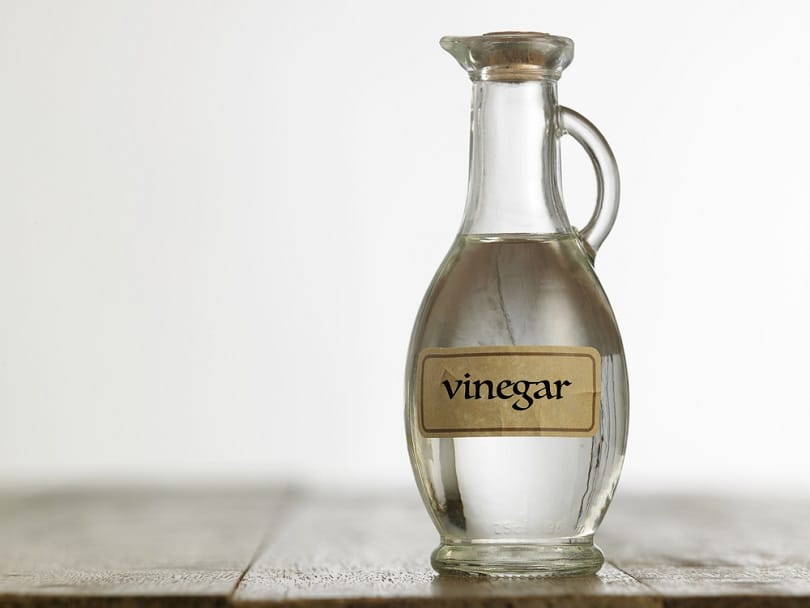
White vinegar is the primary ingredient that can keep cats away from your furniture. It’s a non-toxic natural cat repellent that’s also safe for any other animals in the home.
Castile Soap
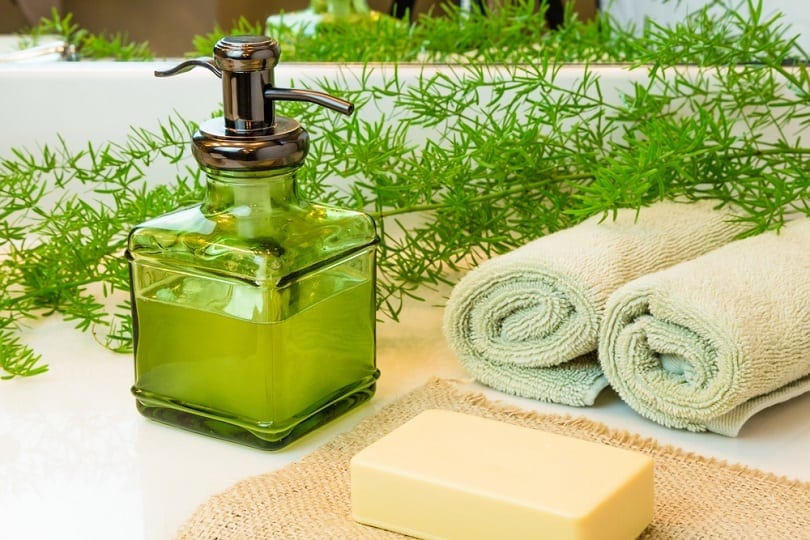
Most household soaps are also natural cat repellants, but many contain harmful chemicals and fragrances you’re better off avoiding. Castile soap is a plant-based soap made from olive oil. It also has no animal products or synthetic ingredients. It’s biodegradable, and you can purchase it as a bar or liquid. We recommend liquid castile soap for this recipe.
Water

Water allows you to reduce the strength of your formula by diluting it. If you feel the resulting formula is too strong, or your cats have too strong a reaction, adding water will weaken it. Only a tiny amount of water will reduce the range and strength of the odor significantly.
You may also want to weaken the formula if you are worried about staining the fabric. Remember that white vinegar and castile soap are powerful cleaners, and old furniture can hold a surprising amount of dirt that the formula can lift, resulting in a discoloration of the fabric. Try the recipe in an inconspicuous area first and dilute it with water as necessary.
2. Mix the Ingredients
Here are the amounts of each ingredient.
Ingredients
- 8 oz white vinegar
- 8 oz castile soap
- 8 oz water
Instructions
- In a large mixing bowl, combine white vinegar, castile soap, and water
- Pour the solution into a 32-ounce spray bottle and shake vigorously
- Add more water as needed
3. Spray the Solution
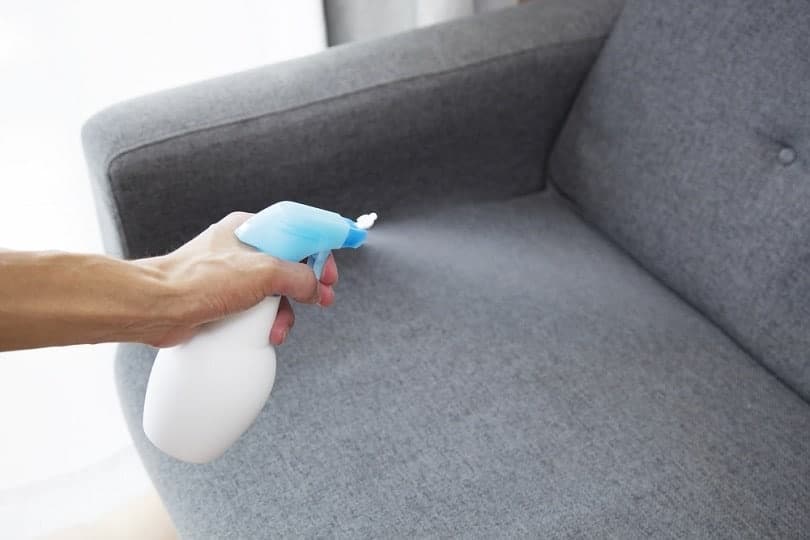
With the solution in the spray bottle, you can spray it wherever you don’t want your cats to go. You will most likely need to spray the area once a day until your cat avoids it.
4. Tailor the Recipe
As we mentioned earlier, you should add more water if you notice the spray is discoloring your fabric. You can also reduce the amount of water you add if you feel it isn’t strong enough or you intend to use it outside. The scent will affect cats much less outdoors, and you will need to re-apply it more often.
Other Things You Can Try
Purchase a cat bed that they can use to rest on instead of your furniture. Many companies design beds with cat comfort in mind, and you can provide them with a better choice to convince them to abandon your furniture.
Make sure there are plenty of high places your pet can sit. Cats like to sit in high places to survey the room, and the back of the sofa and chairs are ideal spots. Providing more high places around your home can reduce the time they spend on your furniture.
Try a commercial pheromone product like the ones from Feliway. Feliway and several other brands produce synthetic pheromones that closely resemble those naturally produced by cats. The pheromones can help calm your cats, and some can redirect your cat’s scratching to the scratching post. The downside to this product is that it’s expensive and doesn’t work on all cats.
Make sure you have scratching posts your cat can use. If your cat likes to scratch your furniture, you should make sure there are plenty of scratching posts around the home. There are also different types of scratching posts, so try several types for the best chance of success.
Summary
Vinegar is a fantastic way to keep cats off your furniture and help keep strays from visiting your property. It’s completely safe and non-toxic, so you do not need to worry about poisoning your cat. It also helps deodorize the area and is an excellent cleaner. The only downside is its cleaning power can inadvertently stain old furniture by removing set-in dirt.
We hope you have enjoyed reading over our look into keeping your cat off furniture and will try out our repellant formula. If you have learned something new and think it can help others, please share this guide to keeping your cats off the furniture with vinegar on Facebook and Twitter.
Featured Image Credit By: Wan Fahmy Redzuan, Shutterstock

